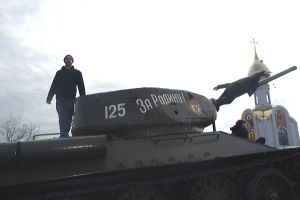
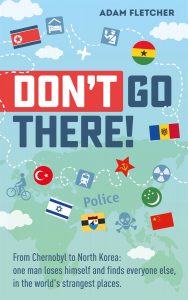
“It’s like The Truman Show fucked The Twilight Zone.”
When the rusty Iron Curtain finally collapsed, a narrow, wonky strip of land called Pridnestrovian Moldavian Republic (or Transnistria, to most) found itself sitting in what was now calling itself Moldova. Moldova had decreed its official language would be Moldovan. A linguistic inconvenience for the mainly Russian-speaking Transnistria.
As Moldova looked west, Transnistria glanced forlornly east, towards Mother Russia. A cultural tug of war ensued. The white arts of diplomacy tried to fix it. They failed. The dark arts of war stepped in. Bearing in mind that Transnistria only had a population of half a million, and is, at some points, just a few kilometres wide, it was a war that should have ended by lunchtime of that same day, with Transnistria waving white flags and issuing humble apologies for having got ideas well above its station.
That was not what happened. Instead, those half a million plucky Leninists called home to Moscow. Moscow was probably flattered. Of course Moscow would send weapons. Lots of weapons.
There was a short war before a truce was agreed. A truce that still exists. The people of Transnistria think they have their own country; no one else does, yet no one is willing to call their bluff and try to take it from them because… Russia.
Unlike Liberland, someone can visit Transnistria without getting arrested. Or, so I hoped. Because, in 2015, I decided to do just that.
So I’d have someone to talk to about the things I’d see, I joined a group tour. Our guides were, Chris and Jack, both Irish. Sober our group were lovely bunch; while drunk, they were awful.
They were always drunk.
They were especially inebriated as we stepped off the otherwise empty train from Odessa and onto the platform of Tiraspol’s central (and only) station. Tiraspol is the capital (and only) city in Transnistria. Depending on your definitions of capital and city.
Immigration
It became clear how few tourists Transnistria receives when we found an immigration officer waiting on the platform just for us. He was a doughy, middle-aged man warming his hands in the deep pockets of his official Transnistrian immigration officer’s jacket. He held his chin at an elevated height that suggested nobility. Carbohydrates and hedonism had swollen his broad face.
Stood next to him was Sergei, the local student the tour company had hired to show us around. He was a young, blond, baby-faced, born-and-bred Transnistrian. He held his chin at a depressed height that suggested humility. Humility he wore like a cape.
“Welcome to Transnistria,” the official said. “Delete that photo!” he barked at Mike, an American sneakily photographing the back of the train station. “This is an official building. No photos.”
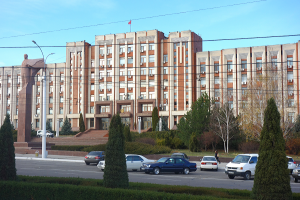
Jack, in his misbuttoned yellow duffel coat, staggered forward to shake the man’s hand. “How you doing, chief. Lovely to see ya.” Officially, Jack was employed as one of our two guides. In practice, he was only qualified to lead a tour through a liquor cabinet. He knew his way around liquor cabinets. Or he knew the way in.
The immigration officer squinted at Jack. He didn’t seem to know what to do with a Jack. “I heard reports of loudness on train. Of wvhisky and beer?” A wry smile escaped from the edges of his mouth. “You will fit in well in Transnistria, comrades!”
At the front of the station we found a rectangular sliding window. Behind it sat a bored woman on a swivel chair. It missed a wheel.
“Hello, darling. Lovely to see ya. You having a good night?” said Jack, crudely balancing his forearm on the frame of her window, his legs swaying beneath it. She said nothing. She didn’t seem to know what to do with a Jack either.
The immigration officer seemed delighted to have an audience. He strutted around like a small child given a badge and told to patrol the sandpit. We huddled in front of the window while immigration forms were dispensed. Forms he didn’t care if we filled in; he just wanted to talk.
“Is there anyone here from France?” he asked first. It was three days after the Bataclan terror attack in Paris. Anne-Sophie, from Paris, raised her hand.
The man raised his fist to the sky, shook it, brought it back down, and kissed its knuckles. “France, very beautiful country…”
“Thank you,” she replied.
“I hear you have been having some…” He paused, trying to find the correct word. “Problems there?”
Anne-Sophie leaned back, seemingly surprised to hear the loss of 130 lives being described about as trivially as getting a bicycle puncture. “The attacks, you mean?”
“Yez. Problems. In your Paris. Terrible. Terrible.” The man put his fist to his heart. “Transnistria stands with you!”
This was both nice and unexpected, and would come, no doubt, as a great relief to France. His voice grew solemn. “Are you refugee?”
Her mouth opened. Nothing came out. She looked at the rest of us for reassurance that her ears were hearing what her brain was reporting. They were. “A… refugee?”
“Yes, you apply for asylum?”
“In… Transnistria?”
The public official puffed out his already inflated chest. “Yes, in Transnistria. Transnistria is great country!”
I guess that depends on your definitions of great and country.
“Erm… well…” She suppressed a smile. “No. I’m just here as a tourist.”
The man lowered his head and closed his eyes. “Tourist, I see. Well, you are welcome.”
“He’s probably never left Transnistria,” whispered Sergei. “This may have coloured his understanding of world. Play along otherwise we won’t get our forms stamped.”
It was a farcical scene. Twelve people from countries that do exist, being drunk and raucous and disrespectful to a man in an oversized coat and hat and a woman on a broken swivel chair, asking for a visa to a country that didn’t.
“Is there anyone here from America?” the border guard asked next. Mike, with the itchy camera-trigger finger stepped into the centre of our huddle. “I’ve been reading about your America,” the man said.
Mike nodded, trying not to laugh.
“I’ve been reading about Detroit.” He said the word Detroit as if it were Atlantis, his eyes wide with wonder. “A lot of wolves!”
“In Detroit?”
“Yes. In Detroit. A lot of wolves.”
“Okay…” said Mike. Slowly our visas were approved. Generously we’d been granted permission to remain in this non-country for twenty-four hours. “It used to be twelve hours,” said Sergei, his arms hanging limply at his sides.
The AIST hotel
At the taxi rank, opposite the train station entrance, we found just one solitary taxi. I ended up in one of the two unofficial taxis he called. It was driven by a lanky, clean-shaven, middle-aged man. He popped the boot of his small car so we could put our luggage inside.
“Thank you,” I said, moving nearer to it with my sports holdall. Looking down into the boot I saw that it contained just one giant speaker and no space for bags.
The man nodded at the speaker, breathed in deeply, then slammed the boot closed. That was settled. Four of us piled into the small car, luggage clutched tightly to our chests. I got the plum seat in the front because of my obnoxiously long legs. The driver climbed in next to me, made himself comfortable, turned to me, winked, and spun the volume dial on the stereo to DEAFEN. House music began to play at a loudness and intensity that surpassed common decency. We were suffocated by bass. The man cackled loudly as he hit the accelerator, the tyres screeched, and we spurted out into the (otherwise silent) Tiraspol night.
The journey was painful, aurally, due to the oppressive volume of this maniac’s music. I self-medicated by imagining how awesome it was going to be here if Transnistria continued to pack as much entertainment into the next day as it had the first forty-five minutes at the train station. It was spoiling us. I decided never to leave, which was going to be difficult since I had to in just twenty-three hours and change.
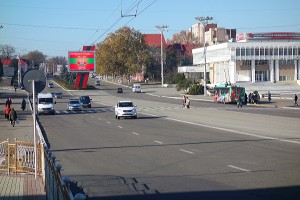
The ride was only five minutes. The city we passed was surprisingly modern, built in a grid fashion, with large, imposing Soviet buildings that all seemed to have been freshly painted and spruced up for something. The streets were empty. We saw no more than ten humans and not a single wolf.
The tiny car screeched to a stop in front of a huge, drab, concrete, Death Star of a building. The driver switched off the engine, turned to me, and cut the air with a sharp nod. We did it, that nod seemed to say. They doubted us, but we did it. I scrambled for the door handle and tripped and fell onto the tarmac, my ears ringing as if punched by Soviet Russia’s finest pugilists. Getting back to my feet, I looked up at the monolith before us. All of its lights were off. It didn’t look like a hotel. It looked like the sort of place hope went to die, had its corpse been dragged out the back and buried, before being dug back up and shot again, just to be sure. What had its architect been thinking? And, perhaps more importantly, had he or she been adequately punished for those thoughts?
In front of what might have once been the entrance, five gigantic male humans stood in a row, all silhouetted in the moonlight as if they were posing for an album cover.
Trance-nistria: So you want to (Communist) Party?
They looked down at this flash flood of foreigners like patients given a long-feared terminal prognosis. “What’s their job?” asked Pierre, a French Canadian who had the useless talent of always looking as if he’d just woken up.
“Menacing?” someone answered.
“Ya’ right boys?” Jack shouted up at them, climbing unsteadily up the few steps to the entrance. “How the devil ’r ya? Lovely night for it, aye?”
The men said nothing, their arms crossed. One turned and unlocked the building’s front door. Its hinges creaked ominously. Inside the lobby we found a graveyard of things that used to be: a smashed-up vending machine covered in a dirty sheet; an eclectic collection of earthenware pots without plants; mismatched furniture thrown together in a heap and left to rust or dust. Sergei talked to one of the men. He confirmed what we were thinking: “Apparently, you’re the only guests.”
“Tonight or in the last decade?” asked Pierre.
Behind the reception desk sat an implausibly old woman, almost certainly the oldest person who has ever lived, surrounded by dust and cobwebs. Possibly she’d been sitting there since the last guests checked out, back in 1967.
“’ello darlin’,” said Jack. Burp. “Lovely to see ya.”
She said nothing. Perhaps because she was mummified.
But then, to my surprise, slowly, she rose from her seat and stepped gingerly out from behind reception clutching a great cluster of keys like a medieval jailer. One elevator was out of order, as indicated by the potted plant blocking its entrance, but she gestured to the other elevator before turning her head to us slowly, like a thoughtful, injured owl.
“I’m not sure about this,” said Mads, as we stepped in. Mads was an affable Dane, a student of law, and my roommate-to-be. The elevator was carpeted. The colour was puke. We held our breath. It groaned its ascent up to the ninth and final floor.
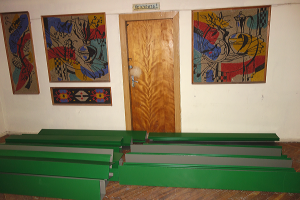
Relieved at having not plunged to our death, we swiftly stepped out into a dark hallway. The AIST had prepared a welcome committee for us here in the form of several piles of awning, pipes, and other things that used to be attached to a building, probably this building, in 1967. A light flickered overhead.
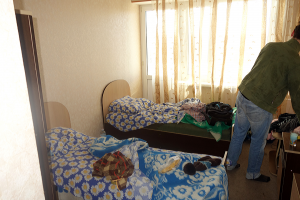
“Blimey,” said Jack. “It’s like Bates Motel fucked The Shining.” The old lady shuffled, as if walking was something she’d read about but not got around to trying just yet, wordlessly towards the corridor’s first bedroom. The beds in it were bare. She gestured towards a chest of drawers. There we found blankets and pillows. “I don’t think we’re the first people to use these,” said Mads.
I fluffed a pillow. It made a cracking sound like breaking glass.
“We’ll take it!” said Mads.
The woman nodded very, very slowly, perhaps unsure of its effect upon her aged spine. She creaked back out into the hallway and on to the next room. Shortly after, we heard laughter emanating from the hallway. We found the old lady standing with their doorknob in her hand. It was no longer attached to the door.
“Feckin’ hell,” said Jack, scratching at the stubble on his neck. A light further down the corridor had seen enough; it flicked one final time and quit the business of illumination. The AIST was a place of wonders. If this was the past, I was more than happy in the present.
A night out to remember
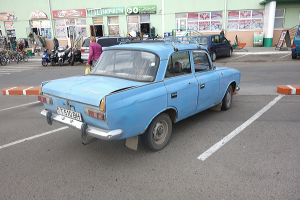
After dropping our stuff, we regrouped in the lobby, keen to explore Tiraspol’s nightlife, not yet aware that it didn’t exist. We found the city’s streets quiet. Very quiet. A dropping pin would have been shushed, had there been anyone around to do so. Two streets later, we did see something moving, when a midnight-blue police car crawled past us. Its driver looked at us as though we were exotic fruit he didn’t know how to eat yet. The police car was a comically small Lada. Ladas are the sort of car eight clowns tumble out of at the circus, one playing the trumpet. It seemed impossible that this could be the vehicle the Transnistrian police used to inspire the respect, awe, and co-operation of the local populace. There must be no crime here. Or no crime committed by people over 1.6 metres. They’d never have fit into the back—well, unless they were clowns.
I hurried my step so I could get closer to Sergei. “Is there a lot of crime here, Sergei?”
He chuckled. “Seriously? This place is one big smuggler’s den. There are some towns I can’t take you to. They’re just big outposts for Soviet weapons.”
“Is it always this quiet?” Chris asked.
“No.” He shrugged. “It used to be quieter.”
“It’s beautiful, though,” Anne-Sophie said.
“Yes. The new prime minister is on a painting offensive, for the election. Paint is cheap. You don’t have to do anything with the insides of the buildings.”
“Is he a good guy?”
“No, not really, same like others.”
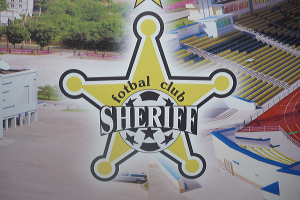
On the fifteen-minute walk to the restaurant we passed ten pedestrians, about a dozen cars, and two police Ladas. We kept seeing the same word again and again: Sheriff.
Sheriff Supermarket, Sheriff Hotel, Sheriff Bakery.
“What is this sheriff?” I asked Sergei between mouthfuls of spicy pepperoni pizza at the only open restaurant.
“The sheriff is the richest man in Transnistria,” he said, taking a swig of beer. “He used to be the police chief, back in the nineties. Apparently he was the only person who could give out business licences, so gave himself all the business licences. Now he owns almost everything. He gets rid of any competition.”
I imagined dissidents being whisked away to remote forests, their hands and feet tied, their faces squashed against Lada windows. The sheriff sounded like a malignant Transnistrian Bruce Wayne, with Tiraspol as his Gotham City.
“I’m surprised that one person can control that much,” said Mads. Sergei lowered his shoulders, his face emotionless. “You shouldn’t be. This is a country that no one knows exists. You can do what you want here.”
“How bad is the corruption then?” I asked.
“Hmm… Let me think…” Sergei’s eyes twinkled. “Ah, I remember. It’s all day, every day. For example, next week I will have my driver’s test.” He took another sip of beer. “I’m going to pass.”
“How do you know that?”
“The guy told me when I booked it. If I want to pass I need to pay him fifty dollars.”
Our mouths tumbled open. “This is why I didn’t go to university. You can only pass if you pay the bribe before each test. I don’t have money. So now I stay home. I go to University of Google.”
As sad as this was, Sergei seemed totally unaffected by it. There was no hint of emotion or resentment in his voice, as if he were reading the weather forecast for a country he knew he’d never visit.
“Do you think Transnistrian culture will change over time?”
“There is no Transnistrian culture,” he said, forcefully. “We’re Russian. That’s it.”
After dinner, the group wanted to go “drinking.” A novel idea and a nice change of pace from all the drinking they’d done earlier in the day, and all the previous days.
“I know a place,” Sergei assured us.
“Will it be busier than the restaurant?” Chris asked, scanning the empty seats around us. Three parallel streets of the Tiraspol grid later, we entered a karaoke bar and got the answer: No.
Upon entering, as if on strings activated by the door, two staff members popped up from behind the bar. There were no other guests. “It’s like The Truman Show fucked The Twilight Zone,” Jack said.
The bar staff was composed of a short, stocky woman in her mid-thirties with gritted teeth and the demeanour of someone sucking on a thousand lemons and a younger man with ghostly white, almost translucent skin who appeared, at all times, to be apologising for his own existence. The group warbled their way through some terrible Oasis covers followed by some terrible Beatles covers then some terrible eighties covers and then, just when I thought it couldn’t get any worse, it rained men.
In between, alcohol flowed. I yawned and pinched myself to stay awake. After an hour, an argument broke out. It was between the female bartender and our guide, Chris. “Stop trying to rip me off,” he said, waving his receipt.
The woman adopted a power pose, dropping her hands to her hips. “You said you vanted big one.”
“When did I say that? What’s a ‘big one’?”
She looked him up and down. “You look like you like big one.”
“What the hell does that mean?” He waved his receipt. “I asked for a double. You’ve charged me for a quadruple!”
“You asked for qwadruple,” she said, squinting out from under her furrowed eyebrows.
“Who orders a quadruple rum and coke? That’s not a thing.”
“In Transnistria it is thing.”
He gestured to the empty bar. “If you stopped trying to rip your customers off you might have a few more of them.”
Her eyes narrowed further. “How dare you talk to me this way.”
The woman sent her meek male colleague—who had pinned himself against the wall in an unsuccessful attempt to make himself invisible—outside to wake up the bouncer. The bouncer was sleeping in a chair, his head leaning against the wall. It was a slow night, after all. Possibly it was always a slow night.
The bouncer came inside rubbing sleep from heavy eyes. The barwoman talked to him in Russian. He blinked, slowly, seemingly unaware what any of this had to do with him. He let out a loud yawn. The woman removed one hand from her hip and began waving it in Chris’s direction. The bouncer scratched at patches of his bald head.
“Since I know you like them big, I gave you bigger one.”
Chris tutted. “You can’t charge me for things I don’t order. It doesn’t work like that.”
I was pretty sure it did work like that, just as long as the sheriff said so. Eventually she backed down but only after Sergei stepped in and worked some of his calm, rational, diplomatic magic. Chris’s money was returned to him. She spent the rest of the evening scowling at him, and anyone else foolish enough to enter her eyeline.
At 3am, lights were switched off. We were still the only customers. “I fucking love y’s all,” said Jack, propping himself uneasily against the bar. I’d wanted to go home hours ago but had toughed it out so as not to look like a stick in the mud. We began putting on coats and thinking of sleep.
Mrs Quadruple pushed a piece of paper across the bar to Jack. It was a bill. We were not expecting a bill. The drinks had been paid for as we’d ordered them, sometimes for more than we’d ordered, even. An extraordinary amount of swearing then occurred, most of it from Jack. I’ll censor it now, for those of a sensitive nature.
“I don’t love you, you f****** charlatans,” said Jack, after scrutinising the bill. “They’re trying to fleece us f****** two dollars per f****** song. They’re taking the p*** is what they are, c***s.”
Jack’s outrage was understandable. Two dollars went far in this country. The average wage was just two hundred dollars a month. Our karaoke bill was $110. “Two dollars per f****** song? Are ye having a laugh? I could buy the song for less, and sing it as much as I want,” added Chris, standing next to Jack, shoving the bill back across the bar. “Where does it say it costs that much?” He looked around the bar for a price list or menu. Nothing in the woman’s face moved. Her hands were stuck firm to her hips.
“You never asked,” she said. “I vould have told.”
The life-averse male barman had discovered some very important dusting and bottle rearrangement work to be done in the far corner. He was summoned back and told to rouse the slumbering security guard once more. The guard took even longer to gift us with his dopey presence, which he announced with a loud yawn and some lead-footed shuffling. He looked as if he were being asked to referee a game he’d not read the rules of. The woman squared up to Chris, across the bar, her finger within swatting distance of his nose. “Who are you to give me advice on running business?” she said.
“I’m the punter. F*** this s***hole. Let’s go, I’m not paying it.”
She threw her arms up in the air. “I don’t set the prices. It’s nothing to do with me.”
“Yeah, well, you don’t communicate them either, do you, love?” an irate Jack fired back at her. I thought midnight-blue Ladas were going to be called. Sergei stepped tactfully back in and convinced the three people who had held the microphone hostage all night to pitch in and pay. It was strongly recommended, he said, without saying why. Group tours can be nice, but they depend heavily on the group. In this one, I was a fifth wheel on a party Lada. I already wanted out.
A tour of the city
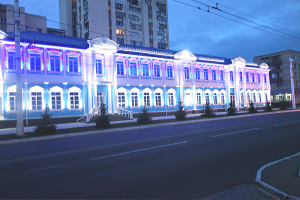
The next day was a beauty. I found the main street approaching a light bustle (by Transnistrian standards). Almost all the people in the broad streets were advanced in age, huddled against the strong wind as they walked over whitewashed pavement. Decrepit Soviet trolleybuses rattled by; commuters pushed up against dirty windows covered in propaganda art showcasing a time of prosperity long gone.
Sergei led a tour of the city. It held my original positive impression of it—calm, unabashedly Soviet, favouring brutalist architecture, not unfriendly or hostile to outsiders, just confused by their existence. He explained that the country’s current president had got elected on an anti-sheriff ticket. The city had only one supermarket, imaginatively called Sheriff Supermarket, but this man, Yevgeny Vasylyevich Shevchuk, had promised that if he was elected, he’d open a second one. As political promises went it was certainly less ambitious than “no taxation without representation,” “better dead than red,” or “make Transnistria great once,” but it had worked nonetheless. His new supermarket had just opened. “Take a look inside,” Sergei said. It looked like any other supermarket, anywhere in the world.
“So is it cheaper than the sheriff’s?” Mads asked.
“No, I think it’s pretty much the same. Probably it’s really the sheriff who owns it anyway,” Sergei added, with his usual portion of nonchalance. “Or a friend of his.”
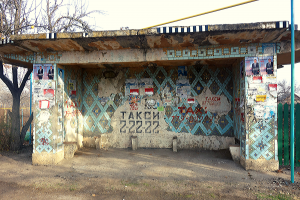
A taxi passed us. Inside, riding next to the driver, was a person of colour. Given the immigration officer’s comments, I found this as unexpected as passing a wolf in downtown Detroit.
“You have black people here?” I asked.
“Of course,” he said, running a hand slowly through his cropped hair. “We have two.”
My head jerked backwards. “What do you mean two? Like two in the whole country?”
“Yeah. They play for the basketball team.”
“Wait, there’s a basketball team?”
“Yeah.” He nodded. “It’s called Sheriff.”
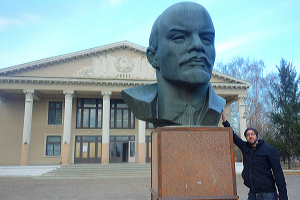
On the way to a flea market we passed several Lenin statues, including one outside of the government offices. Lenin statues were being removed from the Ukraine now, as it began airbrushing its history. Transnistria was fighting progress. Sergei showed me an election poster of the sheriff’s son. “Do you think things will change if the sheriff’s son gets elected? Will Transnistria become a real country?”
“No.” He laughed. “They say every day in the paper that they’re working on becoming recognised. It’s bullshit. Nothing ever happens. They don’t want anything that would threaten their monopoly.”
After lunch we drove out towards an abandoned brick factory. On the way, we stopped at a supermarket in a town outside of Tiraspol. It may or may not have been owned by the sheriff. Sergei returned from it clutching a plastic bag containing a bottle of vodka, an onion, a loaf of bread, and some cheese. At the abandoned factory’s gates he told us to stay put, and disappeared inside with his loot. He returned empty-handed. “You can go in now,” he said. “I’ve bribed the guard.”
We passed the guard’s house. He lived in the derelict building nearest to the complex’s rusty iron gates. Outside his hovel was a bathtub full of junk and scrap metal. He came out to take a cursory look at us. “Hello there, captain. How you been keeping?” said Jack. The man didn’t reply. He was wearing a beanie hat, and had a thick, unkempt black beard. He didn’t smell of roses. He did smell of regret. Sergei said he’d probably been in prison and with nowhere else to go after his release, the government had posted him here to guard what was left of the facility. After we’d been exploring for ten or fifteen minutes, an expensive off-road truck pulled up. A fat man got out and whistled to Sergei. They had an intense conversation. It sounded like war was imminent. But it looked, from Sergei’s face, as if they were old friends inquiring about the health of each other’s mothers.
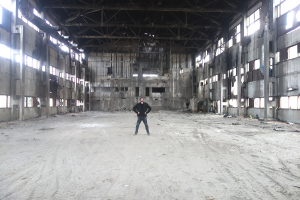
Everything was a negotiation here, everyone wanted to be bribed, yet Sergei never seemed fazed or flustered by the chaos and uncertainty within which he was forced to live. I found him extremely impressive. He was perfectly adapted to his surroundings, like a chameleon, but a chameleon who understood that his surroundings were nonsense and he really shouldn’t keep being asked to blend into them. He wore his stoicism like a shield. The stranger got back into his truck and drove away leaving a cloud of dust.
“Who was that?” we asked.
“Some guy,” said Sergei, flatly. “He says we have to leave, and that the other guy I bribed is not in charge and so I should have bribed him instead.”
Just then the security guard with the wild beard appeared from a different entrance to the hangar we were exploring. He and Sergei had a similarly threatening-sounding conversation.
“It’s okay, we can stay,” Sergei said, afterwards. “The boss man talked to that normal security guard guy and he gave him my number and now everything is okay.”
“So you have to bribe them both in future?” I asked.
“Yeah. Or, I told Mr Truck I would, anyway. I’ll just call the normal guy I bribed today and ask him if the other guy is around. If he’s not then I’ll come.”
“You’re very calm about all this,” I said, sitting on some metal piping.
He shrugged. “Why wouldn’t I be?”
“I don’t know. You don’t get tired of everyone trying to exploit each other?”
“Sure I get tired of it,” he said, like a tortoise about its shell. “But what am I going to do?” I might have tried getting really angry, or having a little cry, or moving to Moscow.
I sat next to Sergei on the ride back to town. “Do you think there’s any ideology here?” I asked. “Do you think people want to go back to Communism?”
He scratched his chin. “No. This is a cowboy country. It doesn’t stand for anything, except money.”
“What do you think is going to happen? Do the people want to have another revolution?”
He laughed. “I’m not sure they wanted the last one. No, I think the people just want to be left alone, mostly.”
I frowned.
“Why did you want to come here, Adam?”
“I don’t know. I thought there was something different happening here.”
“Do you think that now?”
“No.” I sighed.
“Do you regret coming then?”
“Not really. For some reason I’d still rather be here than in Berlin.”
His eyes widened. “Why? I’d rather be in Berlin.”
“I don’t know. Everything just sort of functions there, you know? It’s boring.”
We passed a Soviet tank that was now a memorial of their war of independence. Sergei’s dad had fought in it. “Boredom is a luxury good,” he said.
Boredom is a luxury good. This simple statement dug its claws into me and didn’t let go. Most people in the world don’t get to decide whether or not to engage in politics. Don’t feel so safe and secure and bored that they actively go out looking for danger, just to feel more alive.
“I’d happily swap your boring normal life for mine.” Sergei smirked.
I cleared my throat. “Yeah, perhaps not right now.”
This article is adapted from a chapter in my best-selling travel book Don’t Go There: Chernobyl to North Korea—one man’s quest to lose himself and find everyone else in the world’s strangest places. A few names have been changed.
Had fun?
Then this is the book for you, my friend.
Get new travel stories sent to your mailbox. No spam. Ever. Promise.
[email-subscribers-form id="1"]